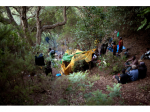 By Jannie Schipper (Photo: Dirk Jan Visser)
By Jannie Schipper (Photo: Dirk Jan Visser)
African migrants in Morocco feel victimised by the locals, and Moroccans in their turn are sometimes scared of the newcomers. The lack of understanding between the two groups is deep, as RNW’s Jannie Schipper discovered on a visit to the forested area near the border with Spain.
„They might eat you“
Six young men are sitting along the side of the road from Fnideq to Ksar Sghir in northern Morocco, their hands held out in a begging gesture. “Be careful, those blacks might eat you”, a Moroccan juice seller in the little border town of Fnideq warned us. They might what? “Yes, really“, he replies. “They can do anything.” Taxi drivers waiting for customers at the dusty square are just as unenthusiastic about visiting those Africans camping out in the forest. “Don’t go there, it is dangerous.”
“Arabs hate black people. And that is not from today. It is in their blood“, says Aboubakr, a young man from Senegal who is hoping eventually to cross over into Europe. He spent almost a year in Morocco’s capital Rabat before coming to this forest camp near the Spanish border, and his experiences there left him feeling bitter. “Friends of mine were attacked with a knife. Bandits target us because they know we cannot go to the police, even if we are robbed and hurt. Having no papers, we will be caught instead. Blacks have no rights here.”
African brothers
Racist attitudes are also evident in other ways. Souleymane from Guinea is angry that Moroccans call him ‘African’ in a negative way. “They should consider us African brothers“, he says. “It is different when a European calls you African, or when another African does.” Aboubakr is also insulted that Moroccans “cannot believe many of us are Muslims too”. According to him, people are surprised when they see him kneeling for prayer. “They don’t think a black can be Muslim.”
Bread and fruit
Over an hour, at least five cars stop along the road. A boy runs to the car, talks briefly to the person inside and comes back with a plastic bag. Some bread, some pieces of fruit, sometimes a little money. “My mother buys bread to bring it to them“, a young woman from nearby Ksar Sghir tells us. It’s a natural humanitarian gesture to her. “They are living there without anything, we have to help them.”
A poultry seller in Fnideq keeps chicken feet for the Africans living in the forest because they like them and Moroccans won’t eat them. He feels sorry for them: “They just want to go to Europe. They have nothing here.”
Life in the forest
The young Africans push their way through the trees and cross narrow streams to get to what they call ‘the ghetto’: a small camp in the forest, about half an hour’s walk from the road. Aboubakr is staying there with some twenty others, mainly Senegalese and Guineans. ‘The ghetto’ consists of an improvised tent and a small wood fire with some pots and pans.
A few hundred meters further down the mountain, there are similar camps with people from other countries. Some have been there for months, waiting for a chance to get to Ceuta, a Spanish enclave in Morocco. Almost all of those living in the woods have already tried to cross the border more than once.
Closed borders
With Europe guarding its borders more and more closely in recent years, many migrants from Sub-Saharan countries are now stuck in Morocco. Some work as housemaids or as day labourers. Very few find any regular employment. The authorities treat the migrants with a mix of negligence and occasional crackdowns in the form of raids and extraditions. Local reactions are also mixed.
„Years ago, people had to get used to their presence, but now the relations are okay“, says a shopkeeper in a mountain village near the forest. A tall, black man walks into the shop and purchases rice, yoghurt and other food. “The authorities advise me not to sell to them”, says the shopkeeper, “but I sell to anyone. We’re all the same.”
It’s not in their culture
Contact between the two groups is mostly limited to a simple hello and goodbye. Neither the shopkeeper nor the poultry seller nor the young woman we talk to have any African friends. And the migrants in the woods seem to have as limited a vision of Moroccan culture as Moroccans have of theirs. “We are just working for them“, says one of the Africans. “Some treat you well, others badly. But they all pay very little.”
Many blacks in the soccer team
The migrants are reluctant to believe that they might meet more racism in Europe than in Morocco. „Black and white people are good together“, claims Aboubakr. „In Holland, there are many blacks on the national soccer team. Moroccans are just jealous.“
„I have stopped caring if they are racist or not“, says Jules from Cameroon, „as long as they have work for me. And Moroccans don’t, so I need to go to Europe.“
The pictures are part of Dirk-Jan Visser’s ongoing project ‘Status: Undocumented‘.
Source: http://www.rnw.nl/english/article/“arabs-hate-black-people”
